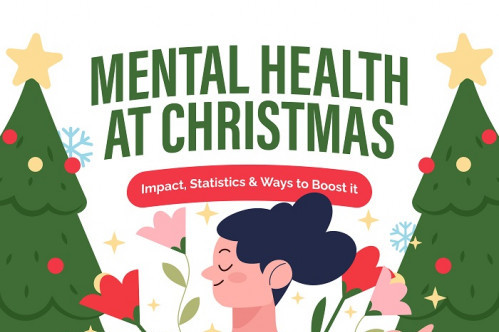Mental Health at Christmas (and ways to boost it!)
For most people, Christmas is about spending time with loved ones, opening presents, eating lots of chocolate and taking a break from the stresses of normal day to day life.
Nevertheless, with the expectation of having the ‘perfect’ Christmas getting higher every year, it’s no wonder lots of people struggle with their mental health during the Christmas break. In fact, YouGov ran and study and found that over two in five people admit to feeling stressed during the Christmas period, and one in four felt anxious or depressed [1].
Why people may suffer from negative mental health during Christmas
Financial Strains
It’s no secret or surprise that Christmas is getting increasingly more expensive. For many adults in the UK, rent, mortgage rates, bills and day to day living costs are increasing rapidly. So, when Christmas comes around it’s now becoming increasingly difficult to afford presents for loved ones, as well as decorations. This financial strain is bound to put pressure on any individual, leading to stress and anxiety.
More Alcohol
In addition to money worries, people tend to consume more alcohol around the festive period. As alcohol is a depressant, it increases levels of anxiety and worsens your level of sleep. [2]
Cold Weather
The cold weather in December might have a big impact on your mental health. As the nights get longer, you might be suffering from seasonal affective disorder. With a lack of sunlight, you might start to feel sad or depressed.
Loneliness
According to Mind, 20% of people in the UK agree that Christmas time makes them feel lonely. [3] Christmas can sometimes highlight to some individuals who maybe don’t have a big family or friendship group that they are spending the festive period alone, when others are spending it with family. Loneliness may not be a mental health issue in itself, but it can often lead to anxiety or depression.
Reminded of Loved Ones who have Sadly Passed
Christmas time always tends to remind people of those who are sadly no longer with us. It may throw up certain memories with your loved one, which may make you feel sad, lonely or even slightly angry that you’re unable to spend time together.
These emotions can be heightened even further if their passing has been recent, especially if this is your first Christmas without them present.
Ways people can protect their mental health during Christmas
Here are several ways you can look after your mental health during Christmas.
Take Time for Yourself
Christmas time is a very busy and demanding time for lots of people, with meals, parties, shopping, cooking, and organising to do. Take some time for yourself to relax, take a bath, do some exercise or simply go for a walk to clear your head.
Maintain a Healthy Diet and Watch Your Alcohol Intake
Although eating well might be a bit harder over the festive period, try to make sure you’re eating five portions of fruit and vegetables every day, even alongside your pigs in blankets. Also make an effort to watch how much you’re drinking and be confident saying no when you think you’ve had too much.
Stop Comparing your Christmas to Others
With social media making it easier than ever to compare your Christmas to others, maybe take a break from social media and stop comparing what you see on social media to your reality.
Plan Ahead
As a lot of mental health issues stem from being stressed at Christmas, make time to plan ahead for any meals, presents or events you’ve got on. This will make you less stressed and more organised.
Feel free to save the following infographic to your phone or device, to remind you on how to stay on top of your mental health this Christmas.

References
[2] Covered in the guide Alcoholism and addiction Rehab in Manchester guide.



